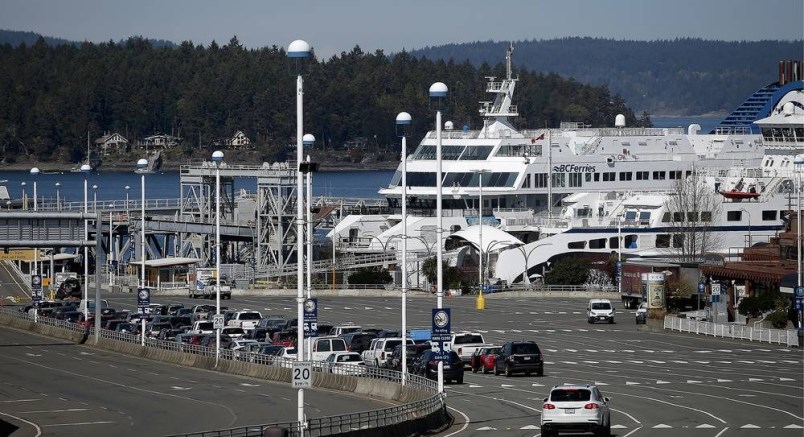People who live in the Island Health region should not be travelling for recreation between Victoria and Nanaimo, says B.C. Solicitor General Mike Farnworth, who is drafting orders against non-essential travel between health authorities that will include vehicle checks at ferry terminals.
“If you’re in Victoria, you know, don’t go up to Nanaimo,” Farnworth said Wednesday. “If you’re in Nanaimo, don’t go up to Port Hardy. That’s already in place, and most people are doing the right thing.”
B.C. Premier John Horgan on Monday announced a suite of measures focused on stopping non-essential movement between health authorities to limit the spread of the COVID-19 virus.
BC Ferries has been asked not to take reservations for recreational vehicles travelling between health authorities, and tourism-oriented businesses such as hotels and tour companies have been asked not to take out-of-health-authority bookings.
“What we are wanting to do is limit recreational travel between health authorities and so the ferry terminals with the Island are the obvious location to do that,” said Farnworth.
There will be CounterAttack-style road checks at ferry terminals on and off Vancouver Island and the Gulf Islands, and possibly heading into the Interior Health region via the Hope-Princeton Highway or Coquihalla Highway.
Those who travel between health authorities for non-essential reasons will be fined, although the amount has not been disclosed. The fine can be disputed but after 30 days, unpaid undisputed fines will be sent to a collections agency, the province says.
Farnworth said he expects to introduce measures in the legislature in the next few weeks to strengthen the ability to collect those fines. “People will be paying them.”
Essential travel is loosely defined as the transport of essential goods and travel to medical appointments and for the purpose of child care. More detailed information on what is considered essential travel should be available by the end of the week, said Farnworth.
Farnworth said Wednesday there will “absolutely will not be” road checks on Boundary Road or Fraser Highway between Vancouver Coastal and Fraser Health authorities, which will be treated as one region.
As for travelling great distances within a health authority — people travelling the more than four-hour route from Victoria to Tofino, for instance — Horgan said earlier that people should use common sense and stay close to home.
The success of the travel restrictions relies on the co-operation of the tourism industry, which the province said has agreed not to accept bookings from outside health authorities, and cancel any bookings that were already made.
The tourism industry, however, is asking for clarification, saying it’s unclear whether a Victoria hotelier must cancel a reservation from a Nanaimo resident or from a visitor flying in from Ontario.
Farnworth promised further details when the order is issued later this week, saying the province is working with the Tourism Industry Association of BC on how to deal with people coming from other jurisdictions.
Signs are expected to be posted at the Alberta border discouraging travel between provinces.
If someone does enter the Interior Health region from Alberta, they won’t be stopped at the border, but should not be allowed to enter another health authority to get to Vancouver, for example, said Farnworth.
The province has been working with other provinces to limit people coming to British Columbia “and likewise British Columbians not travelling outside of their local area,” Farnworth said.
It was international travel that brought the first variant case in the province into the Island Health region.
“We raise our concerns with Ottawa on a regular basis about international travel, whether it is external from North America or whether it’s at the border with our neighbours to the south in the United States,” said Farnworth. “We are always engaging with Ottawa on that issue and we will continue to do so.”
The province is looking at work-arounds in situations such as the small number of people who have to travel between health authorities for ICBC tests, he said.



